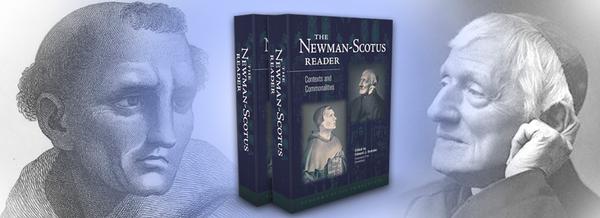
New Book: The Newman-Scotus Reader: Contexts and Commonalities
The Newman-Scotus Reader: Contexts and Commonalities,
ed. Rev. Dr. Edward J. Ondrako, OFMConv.
New Bedford, MA: Academy of the Immaculate, 2015, 744 p. text; 60 p. index. ISBN 978-1-60114-069-2
In a letter to F. W. Faber, December 9, 1849, John Henry Newman wrote: “Certainly, I wish to take the Scotist view on the point [motive of the Incarnation]. It seems to me more philosophical (if one has the right so to talk) to throw the difficulty on creation—as if creation is the great mystery—and if the Supreme condescended to create, to partake in creation was involved. But as I understand the Scotist view it simply is, that He would have been incarnate, even had man not sinned—but when man sinned it was for our redemption; in matter of fact the end was to make satisfaction. (J. H. Newman, Letters and Diaries, vol. 13, p. 335 and 342).
Drawing from the inaugural Newman-Scotus Symposium (Oct. 2010), this edited volume presents principles that converge with striking similarities in the thought patterns of Bl. John Duns Scotus and Bl. John Henry Newman. With contributions from prominent philosophers and theologians, this book argues in detail that Newman was overall sympathetic to many of the major themes characteristic of Duns Scotus’ metaphysics, and furthermore would be cautious about simply substituting historical dimensions and new hermeneutics for a sound metaphysical approach. The more metaphysical approach of Duns Scotus uncovers the implicit notional foundations of Newman’s thought, while the more phenomenological style of Newman assists the reader in grasping the realism and profound spirituality lying behind the more abstract presentation of Duns Scotus. Topics range from the Franciscan-Scotistic motive of the Incarnation, the Scotistic position of sacramental theology, to intuition and certitude, scientific form and real assent, uncoupling Duns Scotus from Kant, the will as the power to self-determine as the essential characteristic of the will, with love as its object, and its relationship to the intellect as moved by the object, the truth, and more.
Features of this edited work include:
- A unique text that offers connections between Newman and Duns Scotus, including a genuine unity of approach and substantially identical convictions concerning the nature of theology and how to conduct it.
- Contributions from prominent philosophers and theologians: Olivier Boulnois, John T. Ford, Timothy B. Noone, Cyril O’Regan, Peter D. Fehlner, Bishop Geoffrey Rowell, Mary Beth Ingham, Patricia Hutchison, Robert C. Christie, Edward J. Ondrako, and the account from Deacon Jack Sullivan of the miracle that led to Newman’s beatification by Pope Benedict XVI (Sept. 19, 2010).
- End of chapter study questions in a progressive pedagogical sequence
- The book is intended for upper level undergraduate and graduate students, professors, and interested persons intuiting modern sensitivity to freedom in its relationship to the will and intellect. Duns Scotus and Newman provide an indispensable basis for grasping the profound insights of the irreplaceable Vatican II and the Church in the Modern World (Gaudium et Spes).
